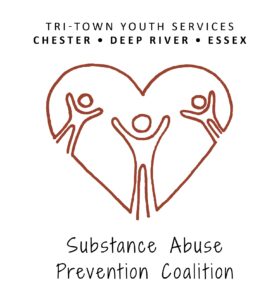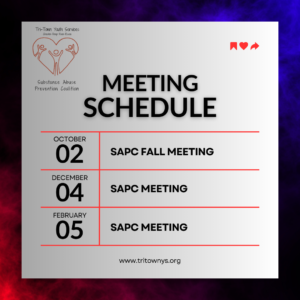
Happy, healthy parents help to make happy, healthy children.
Substance Abuse Prevention Coalition
About SAPC
Mobilize and empower the community to reduce substance abuse primarily among youth through action, education, and collaboration.
The Tri-Town Substance Abuse Prevention Coalition envisions the communities of Chester, Deep River, and Essex CT as safe, healthy and free of substance abuse.
The goals of the coalition are to:
- Reduce substance use among youth and, over time, among adults by addressing the factors in a community that increase the risk of substance abuse and promoting the factors that minimize the risks of substance abuse.
- Establish and strengthen collaboration among partner organizations in support of the community’s effort to reduce and prevent substance abuse among youth.
The coalition will achieve its goals by working simultaneously on key strategies that include:
- Providing information and educational presentations.
- Enhancing skills of our Coalition Members and those in the community who work with youth.
- Providing support for activities that build youth assets and protective factors or reduce risks to our kids.
- Changing the consequences that youth face for drug or alcohol infractions at school or in the community.
- Change policies around alcohol or drug availability in our community.
Formed in 1984 as the Substance Abuse Task Force, this body soon became the Substance Abuse Prevention Council. The SAPC is made up of people from our communities who share a common concern about substance abuse and an interest and commitment toward its prevention. An excellent forum for parents, students, educators, clergy, and people from the business community, law enforcement, and local government also participate.
In January 2013, membership voted to change their name to Substance Abuse Prevention Coalition to more accurately reflect their level of community collaboration.
The SAPC is funded through the CT Department of Mental Health and Addiction Services’ (DMHAS) Local Prevention Council (LPC) grant program. As of September 30, 2016 the SAPC was awarded a Drug Free Communities support grant through the federal Substance Abuse and Mental Health Services Administration (SAMHSA).
The Coalition has also received funding as part of Connecticut’s Strategic Prevention Framework, State Incentive Grant (SPF SIG) along with Youth and Family Services of Haddam-Killingworth and East Haddam Youth and Family Services as well as from ONDCP’s Drug Free Communities Support Program.
How SAPC is Organized:
Tri-Town Substance Abuse Prevention Coalition 12 Sectors Represented: youth, parents, businesses, media, school, youth-serving organizations, law enforcement, religious/fraternal organizations, civic or volunteer groups, healthcare, government and others involved in substance abuse.
Tri-Town Youth Services Bureau
Board of Directors + 5 Professional Staff
Fiscal Agent, Grant Management
Prevention Coordinator
Steering & Sustainability Committee
Leadership Team, Recruitment, Planning and Goal-setting, Marketing & Public Relations
Parent Advisory Group
Hear parent concerns, plan educational events and town hall meetings.
School Partnership Team
Build calendar of classroom lessons, special assemblies and school events centered on positive climate, youth leadership, drug & alcohol awareness, self-confidence and resistance skills.
Youth Action Council
Provide youth perspective on issues, share concerns and develop new initiatives.
Community Wellness Group
Promote & support stress management, self-care and overall good health.
Policy Task Force
Use state, local laws and ordinances & school policies to reduce substance use. Build more comprehensive safety net for higher risk youth (those using substances, in juv. justice or truant).
Successful Prevention:
Prevention science today looks beyond singular problem behaviors at the broader scope of factors that promote or undermine healthy human development. Successful prevention programs consider the greater social and environmental factors that influence a young person’s ability to make informed, healthy decisions that support their physical and psychological safety.
The Social Development Programs at Chester, Deep River and Essex Elementary Schools are a shining example of a comprehensive introduction to school-based prevention work. Increasing protective factors through leadership, community service and consistent messaging about social-emotional life are key ingredients to prevention for young people. TTYSB maintains communication with all three elementary social workers and is pleased to offer support or participate in the Social Development Programs.
Bullying & Harassment: A Guide for Parents and Guardians
http://www.sde.ct.gov/sde/cwp/view.asp?a=2663&q=334606
CT State Department of Education: Resources on Bullying
http://www.sde.ct.gov/sde/cwp/view.asp?a=2681&Q=321940
The Centers for Disease Control and Prevention report that suicide is the second leading cause of death among American youth ages 15-19. Equally concerning are the related depressive and suicidal thoughts, plans and suicide attempts made by youth each year. The 2015 High School Youth Risk Behavior Survey shows that 13% of Connecticut youth are seriously considering suicide in a given year.
National Suicide Prevention Lifeline (Available 24/7) 1-800-273-8255
1 Word 1 Voice 1 Life
http://www.preventsuicidect.org/
PLAN 2020
http://www.preventsuicidect.org/files/2015/04/Suicide-Prevention-Plan-2010.pdf
Survivors of Suicide Loss Support Group of Southeastern CT
http://lysb.org/wp-content/uploads/2014/11/Survivors-of-Suicide-Loss-Support-Group.pdf
January 2017’s Search Institute Survey of middle and high school students revealed that 41% of the students who identified the lowest number of developmental assets (10 assets, or less) also reported that they skipped school once of more in the previous month. Our local data is consistent with research that shows the more developmental assets a young person has, the more consistently they will attend school and the better their academic performance will be.
School Connectedness
https://www.cdc.gov/healthyyouth/protective/pdf/connectedness_parents.pdf
Visit TTYS’s webpage about Substance Abuse Prevention and the risks of using: http://tritownys.org/know-the-risks/
Access Tri-Town Talks: A Prevention Podcast right here to listen to our latest episodes!
Want to get involved?
The SAPC welcomes all who may be interested.
The Coalition meets five times per school year through Zoom. These meetings take place on a Monday, from 6:30 pm to 7:30 pm
Email Faith Sprigg at Faith@ttysb.org for the Zoom link.
